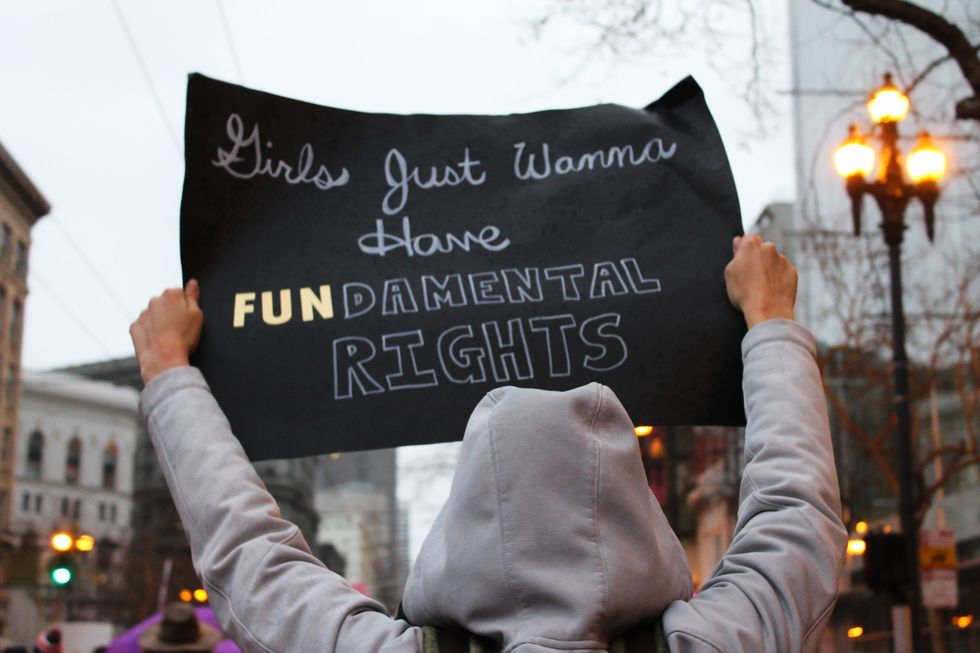The female body has, for longer than any of us can remember, been honored, lauded, defiled, cursed, idealized, trivialized, beautified, criticized, mutilated, abused, and worshiped.
Throughout history, we can see it exalted as a source of sensual pleasure in the Greek goddess Aphrodite; as a figure of chastity and holiness in Mary, mother of Jesus; and as an object of domination and portrait of submissiveness in “gentlemen’s club” billboards you might find alongside the highway in rural Pennsylvania.
What makes a woman a woman? Is it that radical to think that, perhaps, she has nothing to do with any of those figures?
Is it possible that she is a real, thinking, breathing, living creature? That she is human?
The objectification of women’s bodies is keeping us from seeing them as they are—human.
And it is keeping us from understanding the current 3.7 billion women on Earth.
We need to normalize periods.
Mainly, for the reason you just cringed at that last sentence (and I know you did, stop lying to me).
Think with me for a second: 3.7 billion. That's quite a large number. Imagine what 3.7 billion people could do. Imagine what 3.7 billion people looks like: it's estimated that 20-30,000 Egyptians built the Pyramids. At his prime, Napoleon had around one million men in his Grande Armée. It took 400,000 men and women to land humankind on the moon.
Think about that number, 3.7 billion. There are approximately 3.7 billion women alive on Earth right now, and most if not all will have, are having, or are about to have their period.
Stop cringing.
"Period" is not a dirty word. "Menstruation" is not a swear.
A few days ago, I came across an interesting BBC News article. Senior reporter Megha Mohan recounts her recent experience of having been forced to stay behind while her family mourned the anniversary of her grandmother's death at the Ramanathaswamy Temple in Rameswaram, India. She was not allowed to enter the temple—all she had done was ask if anyone had a tampon, and suddenly, everything changed.
Mohan goes into further detail as she decided to investigate the various reasons why in Hindu culture, a woman on her period isn't allowed to do certain things. In Smarta Hinduism, women are considered impure while on their period. But in Shakta Hinduism, women are considered too pure, and shouldn't be dirtied by going to the temple. Though I knew my own culture was worlds away, I couldn't help thinking: why does this sound so familiar?
Are our skewed concepts of women and their bodies informing how we understand the way they work?
In 2012, Belgian academic Philippe Bernard and his research team investigated “whether sexualized women, but not sexualized men, are recognized in the same way as objects are.” Sexual objectification, the report claims, causes the perception of decreased agency, dehumanization, and a diminished sense of human nature attributed to the subject.
Participants in the study (78 college students consisting of 41 men and 37 women) were presented with a series of photos of men and women in either swimsuits or underwear with neutral facial expressions. Some images were presented right-side-up, while others were upside-down. The screen portraying the images would go black, and then would ask the participant to identify the picture they just saw, all right-side-up.
Upside-down photos of people are different than ones of objects; they are harder to identify when flipped right-side-up since we are hard-wired to recognize human beings in a certain, distinct way. We don’t think of objects with the same mindset, so our recognition of a flipped photo should be stronger if the image is an object. In other words, researchers were testing what is called the “sexualized-body-inversion hypothesis.”
Bernard’s team found that participants recognized the photos of right-side-up men better than the photos of upside-down men, indicating that men were seen as human beings. Sadly, but perhaps not unexpectedly, “the women in underwear weren't any harder to recognize when they appeared upside down, indicating that the sexy women were consistently identified as objects.”
It's not exactly a secret that our culture generally sexualizes the female body. If we then see women as objects, we deny them credibility. We deny them humanity. And we deny them the right to normalize periods as a fact of life and a point of discussion.
The objectification of women even causes women to subconsciously internalize the fact, to see themselves as objects. We tell our female friends to keep it to themselves; men shouldn’t have to know about the monthly blood pooling between their legs. No, we say, of course men shouldn’t have to know how the female body works, nor accept it, nor stop taxing it (37 U.S. states still tax feminine products as “luxury items”).
This is what we tell women when we objectify their bodies. We do not see them, we do not hear them. 3.7 billion women.
In 2015, the Australian menstrual pad company SOFY BeFresh created global controversy for their ad depicting “a woman staring into her mirror at her supposed "period counterpart" — only the person she sees in the mirror is several sizes larger than she is, and a borderline-psychotic mess who makes Gone Girl look like Goldilocks.” Emma Lord of Bustle writes, “it's not enough that women are constantly under unfair scrutiny about menstruation in their personal lives, in their workplaces, and even in political forums. Now the people who are selling us the products can't stop themselves from massively insulting us.”
Even PMS (or premenstrual syndrome, which some studies have found is most likely only a factor and not the main cause of monthly moodiness) has been objectified.
There must be a reason why a 2011 Guttmacher Institute study found that 58% of birth control users do not take the pill for contraceptive reasons*, and yet the Trump Administration and the Republican-led Congress moved to allow employers to forgo offering birth control in their health insurance plans.
There must be a reason why I buy a certain brand of tampons whose packaging doesn't make it sound I'm eating a bag of chips in the stall. There must be a reason why I stuffed pads in a lunchbox and carried it across campus to my sister because she requested that I be discreet.
Why are we hiding a part of ourselves? Why have we been taught shame?
Why are we told that our bodies are a source of shame?
The thing is, we don’t need to take our bodies back. We already own them.
We just need to remind the world.
*According to the study, "the most common reasons women use the pill include reducing cramps or menstrual pain (31%); menstrual regulation, which for some women may help prevent migraines and other painful “side effects” of menstruation (28%); treatment of acne (14%); and treatment of endometriosis (4%)."

























